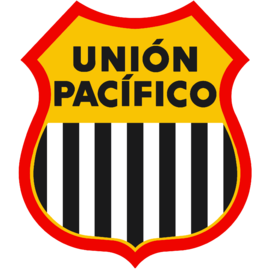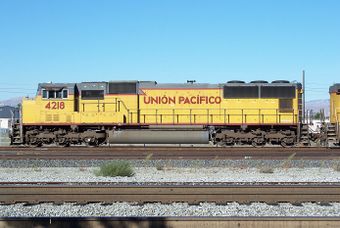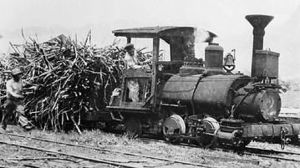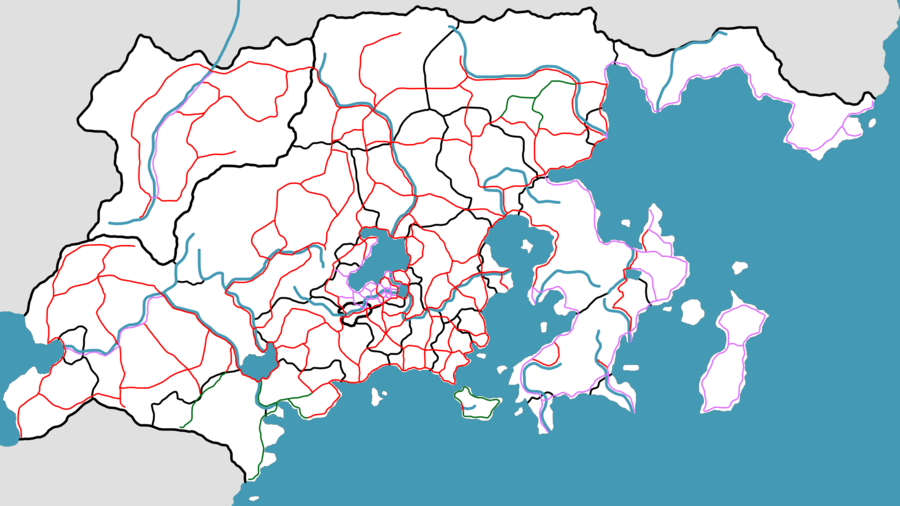Unión Pacífico
 | |
 A Unión Pacífico Santino Dávalos SD70 in 2007. | |
| Overview | |
|---|---|
| Main region(s) | |
| Other region(s) | |
| Fleet size | 3,337 locomotives |
| Headquarters | 1400 Calle Paz San Salvador, Creeperopolis |
| Reporting mark | UP (freight), UPP (passenger), UPM (military), UPPF (yard) |
| Dates of operation | 1870–present (154 years ago) |
| Technical | |
| Track gauge | 5 pi. 93⁄10 pl. (4 ft. 81⁄2 in.; 1,435 mm) |
| Previous gauge | 3 pi. 10 pl. (3 ft. 6 in.; 1,067 mm) (until 1910) 6 pi. (5 ft. 521⁄32 in.; 1,668 mm) (1910–1952) |
| Other | |
| Website | www.unionpacifico.org.cr |
Union Pacific (Atlántidan Spanish: Unión Pacífico; Castillianan Spanish: Xunión Pacíficu; Creeperian: Unión Pacífico; Salvadoran: Unió Pacífic; literally meaning Peaceful Union; reporting marks UP, UPP, UPM, UPPF) , officially the Union Pacific National Railroad Corporation (Atlántidan Spanish: Compañía Ferrocarril Unión Pacífico; Castillianan Spanish: Empressa Redecercaníes Xunión Pacíficu; Creeperian: Empressa Ferrocarril Unión Pacífico; Salvadoran: Empresa Ferrocarril Unió Pacífic) is a railroad company that operates over 3,000 locomotives across every department and client state of Creeperopolis. The railroad holds a monopoly on track rights in the country and is the largest railroad company on Sur. Unión Pacífico employs around 42,000 people and operates over 3,300 locomotives.
Unión Pacífico was founded in 1870 as the Central Creeperian Imperial Railroad (Creeperian: Ferrocarril Imperial Creeperiano Central) and operated solely in the departments of San Salvador, San Salvador del Norte and Zapatista. It acquired the Western Creeperian Imperial Railroad in 1904 after it filed for bankruptcy and was purchased by the railroad for 4.2 million pesos. The railroad was secured by the Catholic Imperial Restoration Council during the Creeperian Civil War from 1933 to 1949. Following the civil war, the railroad was merged with the Castillianan National Railroad, National Atlántidan Railroad, National Salvadoran Railroad, Northern Creeperian Imperial Railroad, Southern Creeperian Imperial Railroad, and the Western Creeperian Imperial Railroad to form the National Union Pacific Railroad (Creeperian: Ferrocarril Nacional Unión Pacífico) in 1952. The name was later officilly changed to the Union Pacific National Railroad Corporation in 1970. The railroad was called "Union Pacific" so symbolize the unification of the several railroads from multiple countries to form the railroad and the peace across the country that was established to allow for such a merger to occur.
In 1870, the railroad was established as a state-owned company. The Creeperian government managed the railroad until 1933 when it became managed by the Creeperian Armed Forces for the duration of the civil war until 1949. In 1952, the railroad returned mostly to government control, but the Armed Forces retained a 25% of the railroad's shares and retained track rights for certain stretches of tracks. In 1980, the Maroto Botín Aerospace Corporation purchased 5% of the railroad's shares and acquired some track rights between their areas of operation. In 2005, Ramón Cambeiro Muñoz purchased ownership of the railroad and 70% of its shares: 65% from the government and the 5% held by Maroto Botín. As of 2021, Cambeiro Muñoz is the railroad's owner and CEO and holds 70% of its shares, with the military holding 25%, and the government holding the final 5%.
Contents
History
Foundation

Unión Pacífico was established in 1870 as the Central Creeperian Imperial Railway (FICC) by the decree of the imperial Creeperian government of Emperor Adolfo III. The railroad was not the first established by Adolfo III, as he had previously established the Northern Creeperian Imperial Railroad (FICN), originally the Creeperian Imperial Railroad (FIC), in 1837 and the Southern Creeperian Imperial Railroad (FICS) in 1840. The track gauge of the Central Creeperian Imperial Railway was 3 pies 10 pulgadas (3 feet 6 inches; 1,067 millimeters), as were the gauges of the other two railroads. The railroad was owned and operated by the imperial Creeperian government and was centered in San Salvador.
The Central Creeperian Imperial Railway began operations in 1872 and was supplied fourteen steam locomotives: six 0-4-2 locomotives, two Santino Dávalos SD1 0-6-0 locomotives, four Santino Dávalos SD2 2-6-2 locomotives, and two Santino Dávalos SD3 2-8-2 locomotives. The railroad mainly focused on freight operations, only operating one passenger service from Pasadena to Old San Salvador. Until 1899, the railroad was restricted to operating solely within the San Salvador.
Civil war
Modern
Facilities
Active yards
Active stations
Track system
 Full route map of Unión Pacífico. |
Track rights
 Full route map of Unión Pacífico. |
Locomotives and rolling stock
Steam locomotive roster
| Type | Quantity | Numbers | In service | Notes |
|---|---|---|---|---|
| SD1 | 6 | 1–6 | 1872–1900 | One (2) preserved, remainder scrapped. Written off: 4. |
| SD2 | 4 | 7–10 | 1872–1910 | All scrapped. |
| SD3 | 2 | 11–12 | 1872–1912 | Both scrapped. Written off: 11. |
| SD4 | 20 | 13–32 | 1880–1930 | One (13) preserved, remainder scrapped. Written off: 15 and 16. |
| SD5 | 20 | 33–52 | 1885–1950 | Two (33 and 51) preserved, remainder scrapped. Written off: 34–36, 39, 41–45, and 50. |
| SD6 | 30 | 53–82 | 1890–1951 | Four (55, 57, 69, and 81) preserved, remainder scrapped. Written off: 53–54, 56, 58–63, 70–73, and 80. |
| SD7 | 10 | 83–92 | 1895–1951 | All scrapped. Written off: 83–85, 90, and 92. |
| SD8 | 20 | 93–112 | 1901–1955 | All scrapped. Written off: 96–107, 109, and 112. |
| SD9 | 50 | 113–162 | 1907–1960 | Five (120, 123, 145, 160, and 162) preserved, remainder scrapped. Written off: 113–119, 121–122, 129–138, 143, 155–159, and 161. |
| SD10 | 50 | 163–212 | 1917–1960 | Two (189 and 200) preserved, remainder scrapped. Written off: 163–188, 190–199, and 201–212. |
| SD11 | 50 | 213–262 | 1928–1960 | Three (260 and 261) preserved, remainder scrapped. Written off: 213–230, 241–253, and 262. |
| SD12 | 3 | 263–265 | 1932–1939 | All scrapped. Written off: 263–265. |
| SD13 | 49 | 266–314 | 1952–present | Seventeen (266–275, 277–279, 286, 300, 303, and 310) preserved, ten (276, 280–285, 287–290, and 313) in service, remainder scrapped. Written off: 291, 301, 304, and 314. |
| SD14 | 5 | 315–319 | 1957–1980 | All scrapped. Written off: 315–319. |
| SD15 | 1 | 320 | 1960–present | One (320) in service. |
| Total | 319 | |||
Diesel locomotive roster
Rolling stock
As of 2018, the railway had more around 42,000 employees. It also owns 3,337 locomotives, 112,730 freight cars, and 9,078 passenger cars.
By specific kind of freight car, Unión Pacífico owns:
- 21,439 covered hopper cars
- 19,948 boxcars
- 19,192 cabooses
- 15,348 flatcars
- 14,690 gondola cars
- 10,428 uncovered hopper cars
- 6,127 tank cars
- 2,696 refrigerated cars
- 2,122 centerbeam flatcars
- 416 autoracks
- 324 articulated well cars
By specific kind of passenger car, Unión Pacífico owns:
- 3,115 single deck cars
- 2,219 double decker cars
- 1,539 single deck sleeper cars
- 1,221 double deck sleeper cars
- 632 baggage cars
- 418 mail cars
- 24 heritage cabooses
Unión Pacífico also owns:
- 14,967 containers
- 4,070 service vehicles
- 2,202 trailers
Notable accidents and incidents
- 15 November 2007: a Unión Pacífico train carrying sugar derailed outside of Tuxtla Martínez, Zapatista, Creeperopolis. The train lost its brakes while descending a slope called the Cajon Pass and sped up to about 110 mph before derailing at a sharp curve. The crash destroyed 15 homes next to the tracks killing 3 railroad personnel and 9 residences. The crash is the worst freight derailment in Unión Pacífico history and one of the deadliest in Creeperian history.
